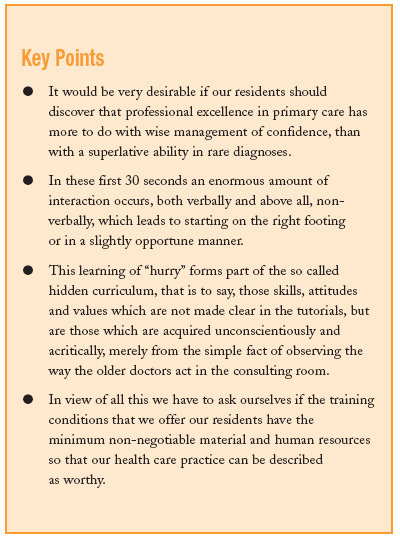Third year residents of community and family medicine, after their hospital training, arrive at health centres with some acceptable clinical competencies.1 It is assumed that during their rotation in the health centres their interest in the psycho-social aspects of being human is accentuated, along with the relationship between disease and biographical context. The care relationship is a relationship of confidence, but also, in part, a friendly relationship. It would be very desirable if with the passing of time our residents should discover that professional excellence in primary care has more to do with wise management of this confidence and friendship, than with a superlative ability in rare diagnoses. However, it does seem that the article by Ruiz-Moral et al2 (in this issue) brings us good news in this respect. The resident appears to direct his energy in a very focused way to obtain information essential to resolve the patient´s problem.
Adjustment to a reality committed to "5 minutes per visit"? Probably, but surely also due to the intrinsic difficulty to assimilate an interview method which involves carrying out several tasks.
We highlight 2 basic tasks in the initial phase of the interview: to clarify the patient concern, suitably preventing what we have called "additions" (equivalent to the Anglo-Saxon term "by the way"), and leave a space for the free expression of this concern (the famous "fire away" of the semi-structured interview.3 As regards the first task, the authors do not report the level of compliance, but they do emphasise that many interviews end with added concerns in the closing phase. On the second task, they tell us that almost half of the interviews are redirected by the doctor.
For years, groups of colleagues have been micro-analysing hundreds of interviews using the PBI method (Problem Based Interviewing). Just 30 seconds of interview are sufficient (just as in the work of Ruiz-Moral et al) to draw conclusions on the concern of the patient, the level of concentration of the professional, his work discipline (or lack of it), or the established cordiality of the relationship. In these first 30 seconds an enormous amount of interaction occurs, both verbally and above all, non-verbally, which leads to starting on the right footing (attentive, cordial professional, with an interview plan), or in a slightly opportune manner (field-dependent professional, distant, in his "castle of expert superiority"). The Ruiz-Moral et al article provokes reflection on the extent which apparently modest objectives, along the lines of improving normal technical skills, are not consolidated as normal working habits.
Do our residents lack much? On the one hand, automated cordiality (how to smile or look at the eyes). Also "let the patient talk," that is, patience, to create an atmosphere of peace and tranquillity. However, is this peace, this tranquillity possible, in crowded clinics, with appointments behind schedule? The clinical interview is always adapted to the environment, and if this affirmation is true, maybe the residents have a sort of wisdom which can be hidden from us due to our determination to analyse them as if they were working in ideal conditions. Could it be possible, therefore, that the third year residents in Cordoba (which can be generalised to the State R3 group), were already infected by the haste which exists in health centres? This learning of "haste" forms part of the so called hidden curriculum, that is to say, those skills, attitudes and values which are not made clear in the tutorials, but are those which are acquired unconsciously and acritically, merely from the simple fact of observing the way the older doctors act in the consulting room. And don't leave out being worried, because if the patients see us stressed and pressured, we lose a good part of our therapeutic power. Time is needed to let the patient speak, to grasp his deeper, hidden feelings even for himself. Put yourself his place with the aim of understanding the situation. We can feign tranquillity and we can make the patient believe that we have the time, but if year after year the doctor works in conflicting conditions, he will end up adapting to the environment, and an interview will re-emerge which combines focal habits ("tell me what's important and don't go off at a tangent"), along with a cold and distant style ("patient-patients come here, not for trifling matters").4 This type of interview, which we will call "adapted to overcrowding," using interruptions to the conversation of the patient causes a perception bias: we end up "seeing" the patient as we want to see him, in keeping with the time we have available. This leads to more added concerns being made at the end of the consultation or successive visits (the problem is not solved).
It is essential that from primary care that we pause for deep reflection in the double sense of the word. On the one hand, we have to reflect upon and adapt our techniques, aims and standards of quality to the day to day reality. We cannot tell something to the resident who may do things that their tutors do not do, nor are done routinely in consultations, as that will condemn them (when they have their own position), to feel like bad doctors. The criteria for good practices have to be adapted where possible, without the final quality being affected. Secondly, it has to be determined what are the non-negotiable material and human resources so that our health care practice can be described as worthy. The population of Spain has increased, maintaining the same health means. Something does not square. Consequently we must be very careful when we criticise (ourselves) the practices of family doctors, and always to say, firstly (and also as regards the residents): we have great professionals prepared to give the best of themselves.









